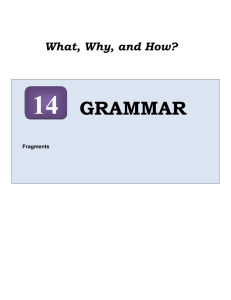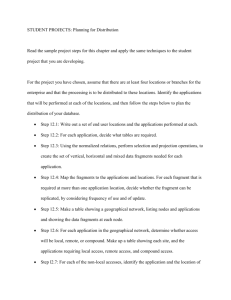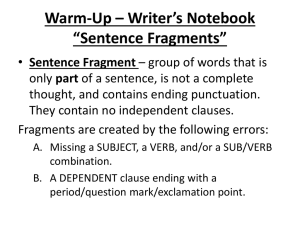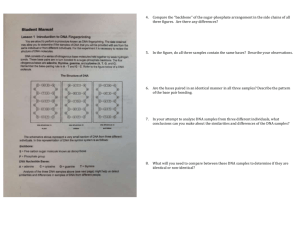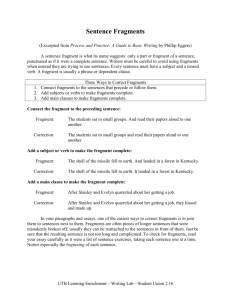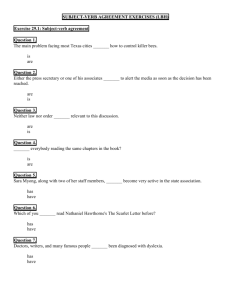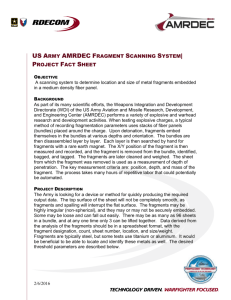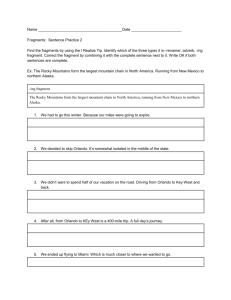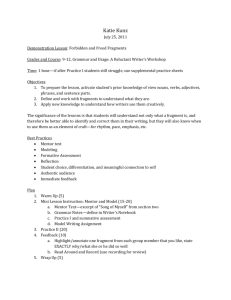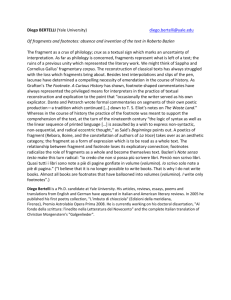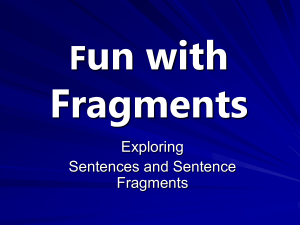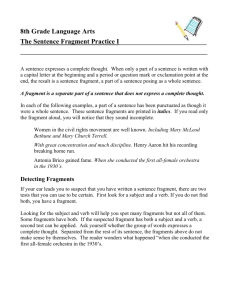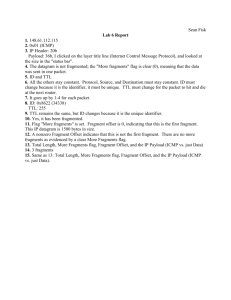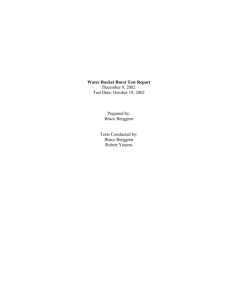Fragments
advertisement
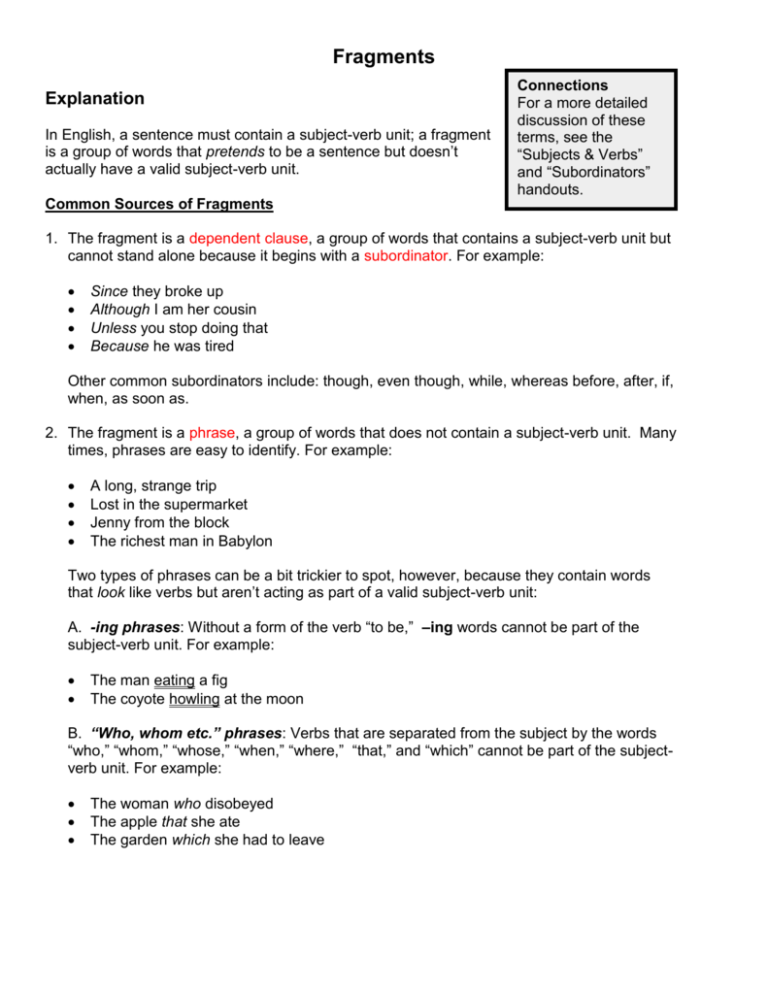
Fragments Explanation In English, a sentence must contain a subject-verb unit; a fragment is a group of words that pretends to be a sentence but doesn’t actually have a valid subject-verb unit. Connections For a more detailed discussion of these terms, see the “Subjects & Verbs” and “Subordinators” handouts. Common Sources of Fragments 1. The fragment is a dependent clause, a group of words that contains a subject-verb unit but cannot stand alone because it begins with a subordinator. For example: Since they broke up Although I am her cousin Unless you stop doing that Because he was tired Other common subordinators include: though, even though, while, whereas before, after, if, when, as soon as. 2. The fragment is a phrase, a group of words that does not contain a subject-verb unit. Many times, phrases are easy to identify. For example: A long, strange trip Lost in the supermarket Jenny from the block The richest man in Babylon Two types of phrases can be a bit trickier to spot, however, because they contain words that look like verbs but aren’t acting as part of a valid subject-verb unit: A. -ing phrases: Without a form of the verb “to be,” –ing words cannot be part of the subject-verb unit. For example: The man eating a fig The coyote howling at the moon B. “Who, whom etc.” phrases: Verbs that are separated from the subject by the words “who,” “whom,” “whose,” “when,” “where,” “that,” and “which” cannot be part of the subjectverb unit. For example: The woman who disobeyed The apple that she ate The garden which she had to leave Strategies for Fixing Fragments In order to turn a fragment into a complete sentence, you have a couple of options. 1. Often you simply need to combine a fragment with a neighboring sentence to produce a grammatically complete sentence. For example: Fragment (in italics) Complete sentence Rocio made that mistake too. But only when she wasn’t paying attention. Rocio made that mistake too, but only when she wasn’t paying attention. Daydreaming about the weekend. I missed Daydreaming about the weekend, I missed my exit. my exit. My chatty next door neighbor. She loves to My chatty next door neighbor loves to gossip. gossip. I’ve never been back to El Salvador. Since I left ten years ago. I’ve never been back to El Salvador since I left ten years ago. 2. Other times, you’ll need to complete the sentence by supplying the missing subject or verb, or by attaching an independent clause Fragment (in italics) Complete sentence A laboratory for the study of animal life in the South Pacific. A laboratory for the study of animal life is situated in the South Pacific. The girl who wanted an ‘A’ in her English class. The girl who wanted an ‘A’ in her English class re-wrote each essay three times. The man thoughtfully scratching his beard. The man was thoughtfully scratching his beard. Since I only had a cookie for breakfast. Since I only had a cookie for breakfast, I was starving by lunchtime. Exercises A) Read the following groups of words and determine if they are grammatically complete sentences or if they are fragments. For example: Going to community college fragment 1. A noticeable mistake which was on the flyer 2. Whenever I get tired of doing my math homework 3. The building across from the library is condemned 4. My roommate who intends to finish college in four years 5. My other roommate has been in college seven years 6. Before the semester began 7. The teacher who liked to listen to the sound of his own voice 8. Because mid-terms are just about to start 9. If I could be left alone to do my homework 10. Although I don’t usually enjoy hard work, I love studying Japanese 11. Listening to tapes in the language lab is really time consuming 12. The boy typed on the Mac in the computer lab 13. The essay that I have to write 14. While I was eating my lunch at the campus center B) Read the following sentences and fix any fragments you find. For example: Sometimes, life is like a movie. A cheesy romantic comedy to be exact. Sometimes, life is like a movie, a cheesy romance comedy to be exact. 1. Anxious about his love life. He decided to visit a fortune-teller. 2. The fortune-teller asked for fifty dollars. And the names of his favorite movie stars. 3. Consulted her astrology charts and closely examined his palms. 4. She predicted someone important would soon come into his life. A tall, dark stranger. 5. While he was skeptical that such a clichéd prediction could come true. 6. The day that he would meet the stranger was cold and foggy. He was sipping hot chocolate at his favorite café. 7. The stranger who would change his life. She walked in the door and ordered a hot chai. 8. She asked if she could share his table. Because the other tables were full of students studying for their midterms. 9. Looking up from his crossword. He smiled and said yes. 10. As she sat down in the table across from him. C) Now, read the following paragraph and a) underline any sentence fragments that you find b) fix these fragments by combining them with adjacent sentences or supplying missing words. In “The Lottery,” author Shirley Jackson implies that human beings are mindless, static creatures. Who cannot or will not free themselves from the domination of tradition. Even when a ritual has lost all purpose or value. This theme is dramatized in her own tale of a town’s annual selection of one of its residents. For sacrifice at the hands of his or her neighbors. On June 27th of every year, the head of each household draws a lot from an old black box. To see whether someone in the household is the fated one. On the day of the story’s action, the proceedings are supervised by Joe Summers. An oldtimer who oversees square dances, the teenager’s club, and the Halloween program. The townsfolk are in a festive mood. Approaching the oncoming massacre of a neighbor with no more concern than they give to the milking of a cow. They are not troubled that they no longer know the reason for the ritual. The purpose that prompted their forebears to initiate the proceedings. They simply consider the drawing a necessity. One of the town’s vital activities. Old Man Warner exemplifies the majority of the villagers. Sheep-like, he follows the dictates of tradition unquestioningly. “There’s always been a lottery,” he says. And, by implication, always will be.

